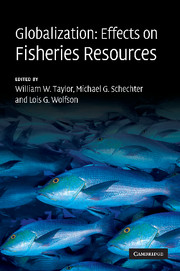Book contents
- Frontmatter
- Contents
- List of contributors
- About the editors
- Foreword
- Preface
- Acknowledgments
- Introduction: Globalization and fisheries: a necessarily interdisciplinary inquiry
- Part I Impacts of globalization on fisheries and aquatic habitats
- Part II Case studies of globalization and fisheries resources
- Part III Governance and multilevel management systems
- Part IV Ethical, economic, and policy implications
- Part V Conclusions and recommendations
- Index
- Plate section
- References
Introduction: Globalization and fisheries: a necessarily interdisciplinary inquiry
Published online by Cambridge University Press: 10 August 2009
- Frontmatter
- Contents
- List of contributors
- About the editors
- Foreword
- Preface
- Acknowledgments
- Introduction: Globalization and fisheries: a necessarily interdisciplinary inquiry
- Part I Impacts of globalization on fisheries and aquatic habitats
- Part II Case studies of globalization and fisheries resources
- Part III Governance and multilevel management systems
- Part IV Ethical, economic, and policy implications
- Part V Conclusions and recommendations
- Index
- Plate section
- References
Summary
Solutions to the key problems of the twenty-first century require interdisciplinary inquiry. Globalization's impact on fisheries, including overfishing, is no exception. This conviction is the foundation for the American Fisheries Society symposium on globalization and fisheries out of which this book arose. Though the language of globalization has rarely been used by fisheries scholars or practitioners, this unique volume readily provides evidence that they had the empirical data and could write detailed case studies about globalization that are almost entirely lacking in the current volumes on that subject being published by social scientists. Moreover, as Folland and Schechter's chapter on global governance suggests many of the key concepts in that field were also preshadowed by works by fisheries scholars, but in materials rarely consulted by social scientists.
In this introductory chapter, we will introduce the concept of globalization and also begin to show how the study of fisheries in this volume can provide insights into many of the key questions animating globalization studies today, such as: Is globalization really anything new? What are the drivers of globalization? What role has the technology revolution played in accelerating the current era of globalization? What are the consequences of globalization, including who benefits and who loses from globalization? What roles do various international actors (e.g., states, intergovernmental organizations, non-governmental organizations) play in the governance of globalization in general and the management of fisheries more specifically? Why do scholars study globalization in general and the relationship between globalization and fisheries in particular?
- Type
- Chapter
- Information
- Globalization: Effects on Fisheries Resources , pp. 1 - 18Publisher: Cambridge University PressPrint publication year: 2007



